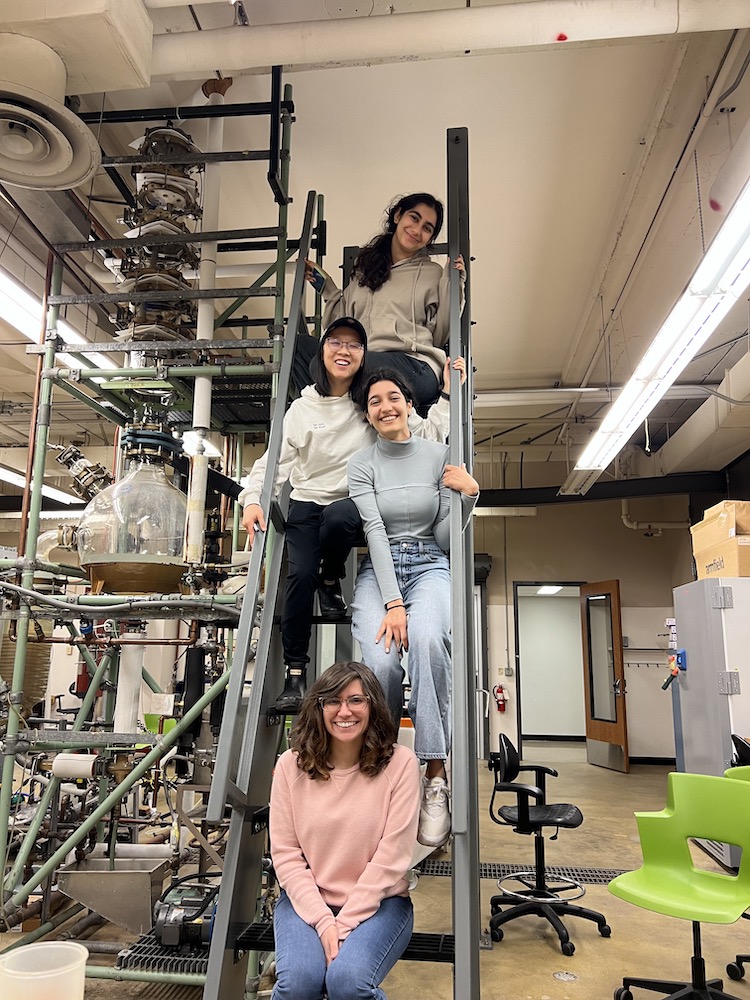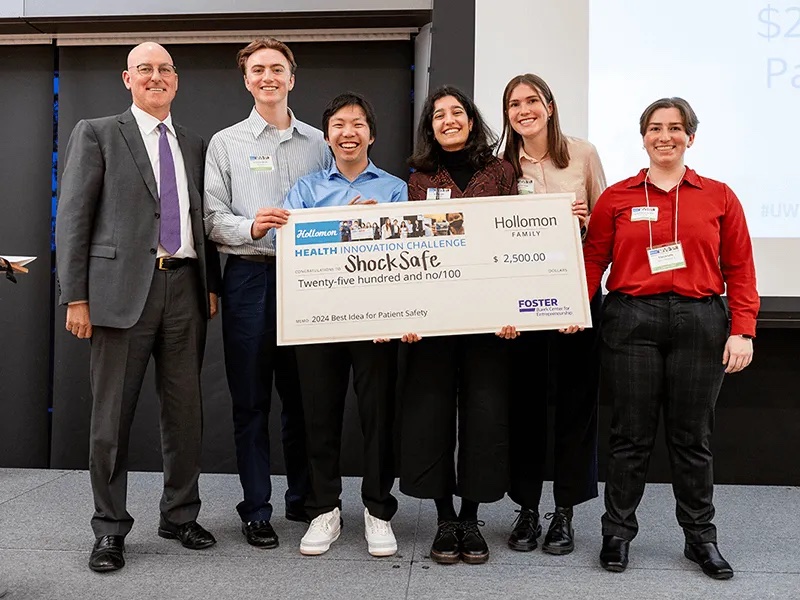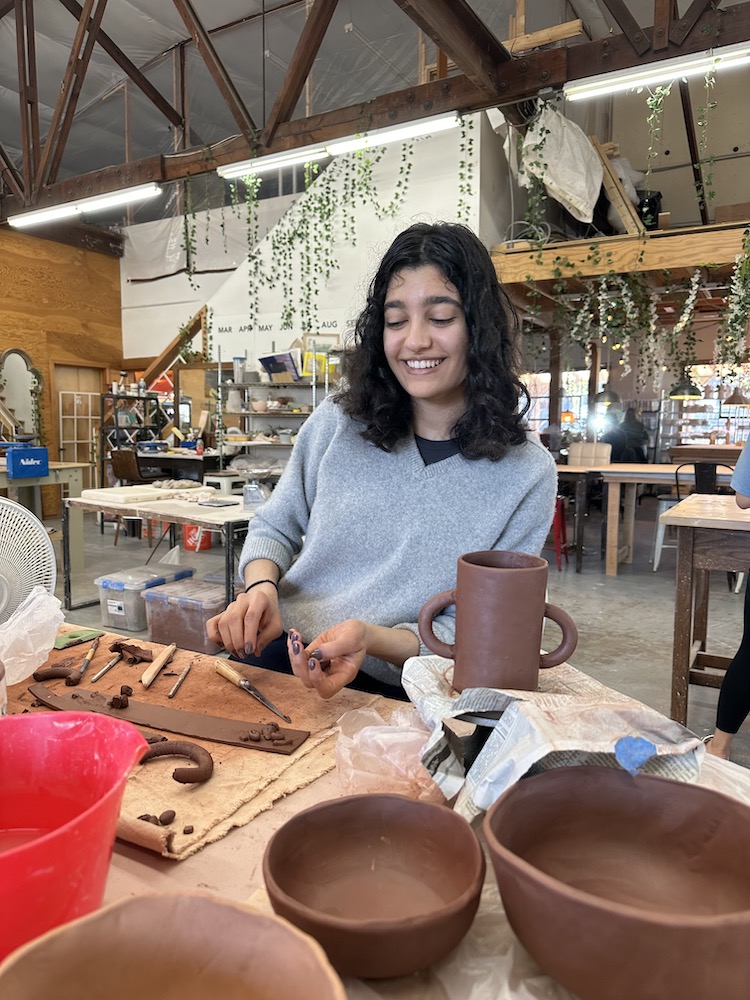June 4, 2024
Graduating senior Sarina Vafa (B.S. ‘24) reflected on her academic experiences leading up to and during her time as a chemical engineering student at the University of Washington, and shares some exciting plans for her ChemE career.
Why did you choose to study chemical engineering?

From top: Keemia Mohammadi, Megan Wong, Sarina Vafa and Professor Alex Prybutok in the ChemE unit operations lab. Source: Sarina Vafa
“In high school, my physics teacher was an engineer before he transitioned into teaching. I talked to him a lot about his work as an engineer, and while I didn’t really understand what engineering was I did get the sense that it was very broad, with lots of opportunities.
At that time I didn't really know what I wanted to do at all, so engineering appealed to me because it was like this big open field where I could also make a significant impact. And with chemical engineering, there were specific research areas that I found really interesting, like health and medicine. Even early on, I knew that my interests may change over time and I wanted to be sure that I could maintain that flexibility long term. I knew that ChemE would allow me to touch a lot of different industries throughout my entire career.”
What was your favorite part about your ChemE experience?
"Being a part of the ChemE department helped make this big university feel smaller and more intimate. The University of Washington is huge and has lots of resources, which is definitely a great thing for students. However, being a part of ChemE allowed me to join and build that valuable close community of support. We have such qualified and caring faculty and staff in this department. They always engage in fun conversations, take the time to support us in our learning, and make sure we all feel safe and welcomed."
What were some unexpected things you learned during your time in ChemE?
"There is a lot to appreciate about how the theories we learn in class apply to real life problems. During my senior year, the entire curriculum was focused on applications and process design, like how to build a chemical plant or how to plan experiments on equipment for business needs. This all includes economic components and logistics that go beyond just science and theory. That’s something I really didn't expect to get out of this major, and I feel like it gave me a really well-rounded industry perspective. There are also a lot of surprising niche applications outside of the core impact areas that I wouldn't have even known existed for chemical engineers. For example, I interned at Starbucks where I worked on coffee equipment. It was really cool to be able to engineer something that is so close to the final product."
What was the hardest part about being a ChemE student?
"It can be really hard to remember to balance studying with other activities. Looking back now, I recognize that there were times, especially in my junior year, when I could have relaxed a little more. I could have cooked more meals or spent more time with friends. It takes intentional effort to set that time aside, because classes are always going to feel like the most important thing. But health and wellness are just as important, too."
What are some things you are most proud of?

Shocksafe won the $2.5k Jim & Timmie Hollomon Best Idea for Patient Safety Prize. Source: UW Foster School of Business
"I thought that winning a prize for Shocksafe in the Hollomon Health Innovation Challenge was really cool. It provided me even more opportunities to learn and practice the business side of things, like how to pitch a project to patent lawyers and health professionals. It really helped me learn to think on my feet in front of a panel of experts.
I'm also really proud of the fact that I built a strong community around me by participating in AIChE. I got to collaborate with graduate students, faculty and staff to plan student activities, and organizing those events made me feel really accomplished.
Figuring out how to incorporate my other interests throughout my degree is another thing I'm proud of. I really wanted to be able to teach and mentor younger students, particularly those from underrepresented backgrounds, first-generation immigrants and others who struggled to feel included in school. I participated in Engineering Ambassadors doing outreach to K-12 students, and I also volunteer at a local high school doing translating and language support for students from Afghanistan."
What are your plans for after graduation?
"I have accepted a position as an associate scientist for the analytics team at Just-Evotec in Redmond! I'm excited to apply what I've learned and also to build new skills and community. Thinking long-term, I’ll probably transition to other areas throughout my career, and at some point I really want to pursue my dream of teaching high school. When asked as a kid what I wanted to be when I grew up, being a teacher was always my answer. I think being able to bring industry experience into a classroom would be very valuable and engaging for students in the future."
Outside of ChemE, what did you enjoy doing for fun?

"I’ve dabbled in a lot of different hobbies throughout the years but recently I’ve been enjoying watching foreign films. Seeing and learning about different world perspectives, cultures and traditions in film is super cool. Because I didn't have a lot of core classes left this quarter, I used that extra time to really lean into my creative side. I'm taking a tango class which has been one of my favorite classes so far, and now I’m recommending it to everyone! I’m also taking another class on Iranian poetry, and I'm taking pottery which is a very fun outlet I hadn’t tried before."
What would you say to incoming students considering ChemE?
"Chemical engineering can be for anyone, and there's no shortage of resources from faculty or your peers to help you succeed here. Engineering in general can be really intimidating for a lot of people, especially students who come from underserved backgrounds or those who haven't had the chance to explore what engineers do. If it is only framed as something reserved for those naturally gifted in math and science, then that really discourages a lot of students from even considering this field. But the thing is, I was never very good at math and science! I had to put in a lot of extra time and effort into that area and really struggled with it through college. In ChemE, I was able to easily find and build a community including many folks that felt similarly, and we were able to support and learn from each other."